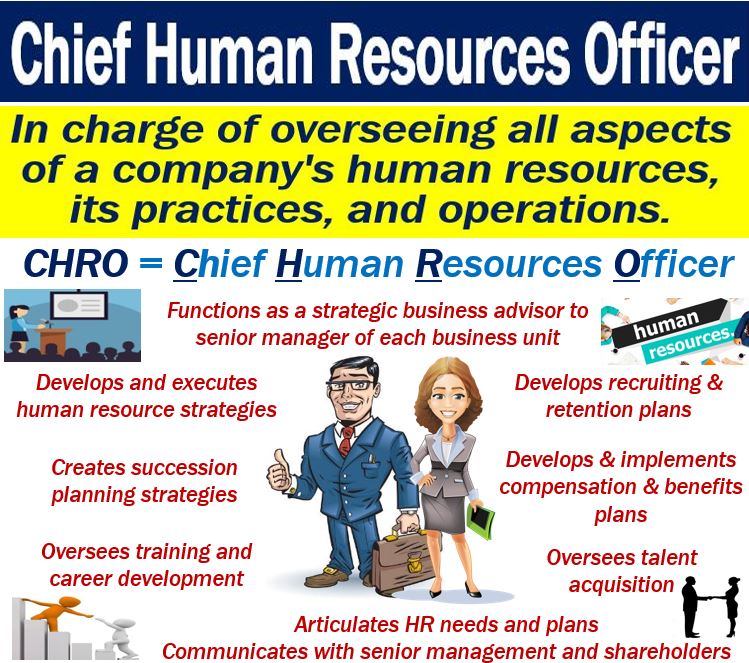At the helm of a companys human resources department sits the Chief Human Resources Officer (CHRO) tasked with overseeing an organization’s employees.
This article provides an explanation of the role of a CHRO, outlining their responsibilities and significance.
A CHRO is a C-level executive. These are people whose positions begin with the letter ‘C.’ CEOs, CROs, COO, and CFOs, for example, are C-level executives. The ‘C’ stands for ‘chief.’
What is a CHRO?
A CHRO is a high-level executive who is in charge of an organization’s employees and overall “people strategy”.
Put simply, the CHRO is in charge of everything related to the company’s human resources. This includes hiring and training people, developing workplace policies, and shaping the company’s culture.
As the head of the HR department, the CHRO makes sure the company finds and keeps great employees. They also ensure that everyone is treated fairly and according to the rules. Other aspects of their role include training workers, and ensuring the company follows labor laws.
In the corporate hierarchy, the CHRO is a member of the “C-suite” (the group of top executives like the CEO, CFO, etc.) and works closely with other leaders to align people strategies with business goals.

Note: Some companies might call this role a Chief People Officer or VP of Human Resources – it’s essentially the same job under a different title.
Key Responsibilities of a CHRO
A CHRO’s duties span many aspects of managing an organization’s workforce. Here are some of the key responsibilities that typically fall under a CHRO’s role:

Talent Strategy and Acquisition
Developing and executing a plan to attract, hire, develop, and retain top talent. This includes overseeing recruitment efforts (talent acquisition) and succession planning for future leadership, ensuring the right people are hired and can grow within the company.

Training and Development
Ensuring employees have access to the training, mentoring, and professional development they need. The CHRO creates or approves onboarding programs, upskilling initiatives, and leadership development to help staff succeed.

Compensation and Benefits
Overseeing salary structures, bonuses, health insurance, retirement plans, and more. The CHRO aims to offer competitive compensation that rewards employees and makes financial sense for the business.

HR Team Leadership and Systems
Managing the human resources department and its resources. The CHRO supervises HR staff and chooses systems (e.g., payroll or benefits portals) to run HR efficiently. They ensure consistent and effective HR policies across the organization.

Company Culture and Employee Engagement
Shaping a positive work culture by implementing engagement, recognition, and wellness programs. The CHRO ensures inclusivity and addresses employee relations issues, like conflicts or complaints, to maintain alignment with company values.

Strategic Partner to Leadership
Acting as a strategic advisor to the CEO and executives on all “people” matters. The CHRO integrates the human element into business decisions, ensuring growth plans or new projects consider staffing requirements and workforce changes.

Compliance and Risk Management
Ensuring adherence to labor laws and employment regulations. The CHRO oversees policies on harassment, discrimination, and safety, reducing the risk of lawsuits or reputational damage by promoting fair and lawful treatment of employees.
A Brief History: How the CHRO Role Has Evolved
The role of the Chief Human Resources Officer has changed a lot over time. Let’s look at how the role has evolved and see why CHROs are so important today.
Early Days – “Personnel” Administrators
Decades ago, the leaders of HR were mostly focused on administrative tasks and were often known as personnel managers. In the mid-20th century, their job was largely about keeping records, processing payroll, and making sure the company followed basic labor laws. The function was seen as paperwork and compliance-driven. Back then, HR heads were not usually involved in major business decisions; they were primarily handling hiring paperwork, organizing employee files, and managing benefits in a clerical way.
Shift to Strategic Partner
Starting in the late 20th century (around the 1980s and 1990s), businesses began to realize that people are a key driver of success. Companies saw that having the right talent and a strong workplace culture could give them a competitive edge. As a result, the top HR role started to become more strategic. The term CHRO came into use as organizations elevated the head of HR to the executive table.
During this time, CHROs moved beyond administration and took on work like aligning HR policies with business goals, talent management planning, and advising CEOs on organizational development. In other words, HR heads earned a “seat at the table” alongside other C-suite executives.
Modern CHRO – Strategic Leader and Change Agent
Today, CHROs are expected to be visionary leaders, not just administrators. The modern CHRO is a strategic leader who helps drive company-wide changes such as digital transformation, culture change, and initiatives to boost employee engagement. They serve as change agents, guiding how the company manages things like innovation, mergers and acquisitions (integrating people and cultures during a merger is often a CHRO’s responsibility), and managing new workplace trends.
CHROs now partner closely with CEOs and other leaders when making big decisions, ensuring that the “people implications” are front and center. The position – once considered purely administrative – has changed into that of a trusted advisor who helps create and shape an organization’s business strategy.
CHRO – Career Path
There is no direct career path for those aiming for a chief human resources officer position. However, there are things you can do to improve your chances of one day getting there.
You should try to gain experience in staff recruitment and coaching. In today’s hi-tech environment, you should also be familiar with all relevant technology and software.
Most companies require experience of up to 15 years and a degree in management or a related field.
A good CHRO should have good leadership and communication skills. Skills in ethical practices are also important as are global and cultural awareness.
